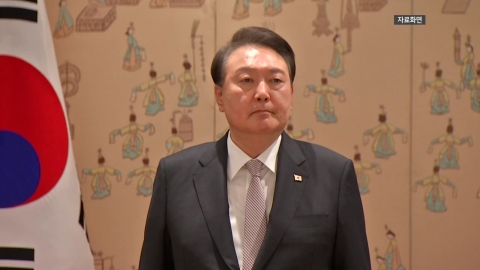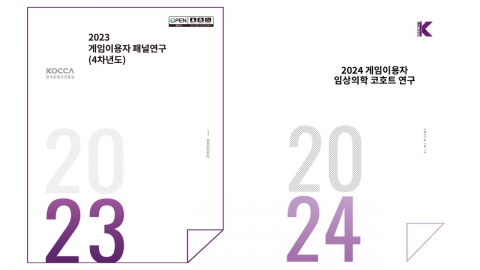Won-Dollar Exchange Rate Hits KRW 1,450 At One Time During The Day On 'U.S. Interest Rate Cut' Shock
Won-Dollar exchange rate tops 1,450 won in early trading on strong dollar
It is the first time in 15 years and 9 months that the intraday exchange rate has exceeded 1,450 won
KOSPI and KOSDAQ both start sharply lower by more than 2 percent
It is the first time in 15 years and 9 months that the intraday exchange rate has exceeded 1,450 won
KOSPI and KOSDAQ both start sharply lower by more than 2 percent
[Anchor]
The won-dollar exchange rate surpassed 1,450 won in early trading due to the strong dollar on the prospect of a delay in the U.S. benchmark rate cut.
Today (19th) our stock market started with a sharp decline of more than 2% for both KOSPI and KOSDAQ, continuing a weak trend.
I'm connecting with the reporter. Reporter Choi Doohee!
The won-dollar exchange rate reached its highest level in 15 years and 9 months during the day, how is the situation now?
[Reporter]
Yes. In the Seoul foreign exchange market, the won-dollar exchange rate opened at 1,453 won, up more than 17 won from the previous trading day.
It is the first time in 15 years and 9 months that the intraday exchange rate has exceeded 1,450 won since March 2009 during the global financial crisis.The
won-dollar exchange rate is currently moving up and down around 1,450 won.
Earlier yesterday (18th), foreign investors turned to net buying for the first time in seven trading days, and the KOSPI, which had rebounded for the first time in three trading days, also froze again in a day.
In the stock market today (19th), the KOSPI started at 2,426.55, down more than 2% from the previous trading day.
Currently, it is moving up and down the 2,440 level, reducing its fall to around 1% on the back of individual buying.
The KOSDAQ index also started down more than 2% from the previous trading day, and is currently continuing the 680-point trend.
As well as the value of the won, our stock market started sharply last night because the U.S. Federal Reserve decided to cut its key interest rate by 0.25 percentage points, suggesting that it would slow the rate cut next year.
Earlier, the U.S. stock market in New York also plunged.
[Anchor]
In this situation, the foreign exchange authorities also issued a message to stabilize the market, right?
[Reporter]
Yes. Deputy Prime Minister and Minister of Strategy and Finance Choi Sang-mok predicted that our financial and foreign exchange markets could also expand volatility in the short term as a result of the U.S. Fed meeting.
It said it would implement additional market stabilization measures boldly and quickly in response to excessive volatility.
Let's listen to Deputy Prime Minister Choi.
[Choi Sang-mok / Deputy Prime Minister and Minister of Strategy and Finance: The Korean financial and foreign exchange markets are also expected to see increased volatility in the short term, as major currencies around the world have weakened significantly. However, excessive leaning in one direction may involve a large reaction in the opposite direction in the future. As a result, it is time for market participants to respond calmly. The government and the Bank of Korea will continue to operate the 24-hour financial and foreign exchange market inspection system with high vigilance and implement additional market stabilization measures boldly and quickly in case of excessive volatility.]
In addition, Deputy Prime Minister Choi added that the economic policy direction for next year will include measures to improve foreign exchange supply and demand to stabilize the foreign exchange market and secure foreign currency liquidity.
Yoo Sang-dae, vice president of the Bank of Korea, also stressed that if financial and foreign exchange market volatility expands excessively, market stabilization measures will be implemented quickly.
This has been YTN's Choi Doohee.
※ 'Your report becomes news'
[Kakao Talk] YTN Search and Add Channel
[Phone] 02-398-8585
[Mail] social@ytn.co.kr
The won-dollar exchange rate surpassed 1,450 won in early trading due to the strong dollar on the prospect of a delay in the U.S. benchmark rate cut.
Today (19th) our stock market started with a sharp decline of more than 2% for both KOSPI and KOSDAQ, continuing a weak trend.
I'm connecting with the reporter. Reporter Choi Doohee!
The won-dollar exchange rate reached its highest level in 15 years and 9 months during the day, how is the situation now?
[Reporter]
Yes. In the Seoul foreign exchange market, the won-dollar exchange rate opened at 1,453 won, up more than 17 won from the previous trading day.
It is the first time in 15 years and 9 months that the intraday exchange rate has exceeded 1,450 won since March 2009 during the global financial crisis.The
won-dollar exchange rate is currently moving up and down around 1,450 won.
Earlier yesterday (18th), foreign investors turned to net buying for the first time in seven trading days, and the KOSPI, which had rebounded for the first time in three trading days, also froze again in a day.
In the stock market today (19th), the KOSPI started at 2,426.55, down more than 2% from the previous trading day.
Currently, it is moving up and down the 2,440 level, reducing its fall to around 1% on the back of individual buying.
The KOSDAQ index also started down more than 2% from the previous trading day, and is currently continuing the 680-point trend.
As well as the value of the won, our stock market started sharply last night because the U.S. Federal Reserve decided to cut its key interest rate by 0.25 percentage points, suggesting that it would slow the rate cut next year.
Earlier, the U.S. stock market in New York also plunged.
[Anchor]
In this situation, the foreign exchange authorities also issued a message to stabilize the market, right?
[Reporter]
Yes. Deputy Prime Minister and Minister of Strategy and Finance Choi Sang-mok predicted that our financial and foreign exchange markets could also expand volatility in the short term as a result of the U.S. Fed meeting.
It said it would implement additional market stabilization measures boldly and quickly in response to excessive volatility.
Let's listen to Deputy Prime Minister Choi.
[Choi Sang-mok / Deputy Prime Minister and Minister of Strategy and Finance: The Korean financial and foreign exchange markets are also expected to see increased volatility in the short term, as major currencies around the world have weakened significantly. However, excessive leaning in one direction may involve a large reaction in the opposite direction in the future. As a result, it is time for market participants to respond calmly. The government and the Bank of Korea will continue to operate the 24-hour financial and foreign exchange market inspection system with high vigilance and implement additional market stabilization measures boldly and quickly in case of excessive volatility.]
In addition, Deputy Prime Minister Choi added that the economic policy direction for next year will include measures to improve foreign exchange supply and demand to stabilize the foreign exchange market and secure foreign currency liquidity.
Yoo Sang-dae, vice president of the Bank of Korea, also stressed that if financial and foreign exchange market volatility expands excessively, market stabilization measures will be implemented quickly.
This has been YTN's Choi Doohee.
※ 'Your report becomes news'
[Kakao Talk] YTN Search and Add Channel
[Phone] 02-398-8585
[Mail] social@ytn.co.kr
[Copyright holder (c) YTN Unauthorized reproduction, redistribution and use of AI data prohibited]
Editor's Recomended News
The Lastest News
-
Prosecutors search and seizure of Meritz Securities... "Suspected fraudulent transactions"
-
Collision with passenger ship due to Navy high speed boat engine failure in India...Thirteen dead.
-
 Four days before the call-up...Police launch an internal investigation into Song Min-ho's alleged "insolvent work."
Four days before the call-up...Police launch an internal investigation into Song Min-ho's alleged "insolvent work." -
재생
 Cooperation Agency Reviews President Yoon's Second Call for Attendance
Cooperation Agency Reviews President Yoon's Second Call for Attendance
![[Breaking News] Grand Code "conditional regular bonuses include ordinary wages...Irrelevant for fixation"](http://image.ytn.co.kr/general/jpg/2024/1219/202412191432542161_h.jpg)
![[Weather] Seoul for the second day -10℃ ↓...Weekend snow rain, up to 10 cm](http://image.ytn.co.kr/general/jpg/2024/1219/202412191243184190_h.jpg)







